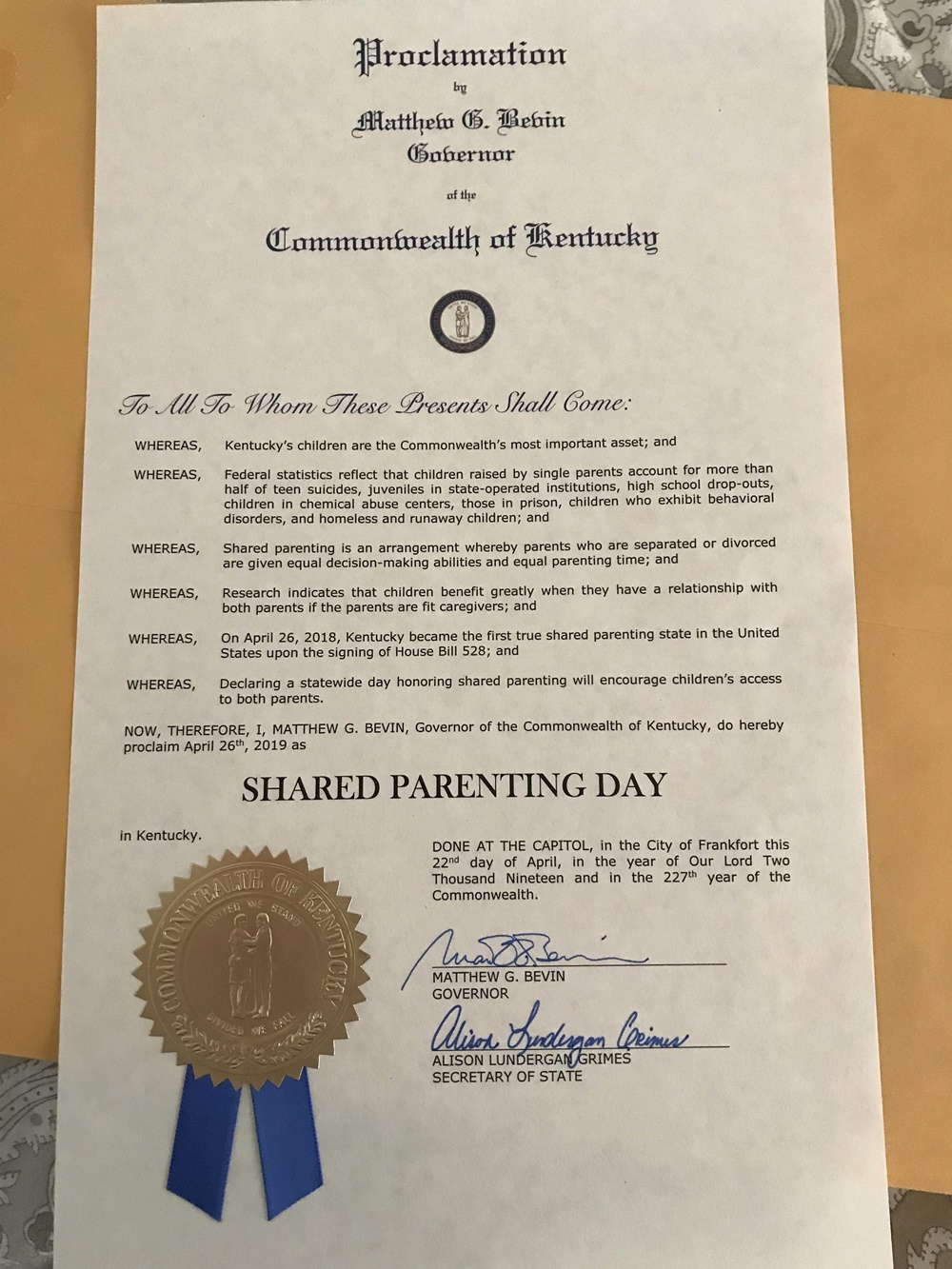May 17, 2019 by Robert Franklin, Member, National Board of Directors, National Parents Organization
The same article I wrote about yesterday goes on from Scott Vogel’s story about spending $130,000 and three years of his life trying to get more than about 14% parenting time with his son and daughter (KARE11, 5/14/19). It discusses a bill before the legislature that would establish a presumption of equal parenting.
State Representative Peggy Scott, R-Andover, is leading an effort to change the law.
She and a long list of supporters feel it’s time for the law to catch up with culture.
“It’s a winner and a loser,” said Scott. “It’s a contest to see who can be a better parent in the eyes of the court. And that’s not fair to the kid.”
Yes, the idea that there has to be a “winner” parent and a “loser” parent has always meant that, whichever parent comes out on top, little Andy or Jenny is the loser. Going from seeing Dad every day and forming an attachment to him to seeing him only four days per month is a trauma for kids. I hope we’ll someday look back on that routine practice of family courts and call it ‘child abuse,’ because that’s what it is. It’s injurious to children. That we have so much science demonstrating the fact and yet still marginalize dads in their children’s lives is not defensible, absent unfitness or abuse by the marginalized parent.
And let’s be clear. When Rep. Scott says it’s time the law caught up to the culture, she’s right, but could have added that it’s time the law caught up to the science of children’s well-being and parenting time. Of course state bar associations doggedly refuse to teach judges those all-important facts revealed by that science, so we can’t entirely blame the judges. But still, it’s not as if the pertinent information is in hiding somewhere. Ask NPO or any of the other organizations seeking family court reform and we’ll all be glad to inform anyone about what the science shows.
Scott’s bill would make a new presumption, right off the bat, that each parent receive 50 percent parenting time. A judge could then alter that if there’s proof one parent would endanger the child physically, emotionally or mentally. The judge can also change parenting time if there are logistical or geographical issues. Parents would still have the ability to agree on a schedule that works best for the child and them without the aid of a judge.
In other words, the bill would presume equal parenting as long as both parents were fit to do the job, but judges would retain flexibility to order some other arrangement if the circumstances required it. And, as ever, parents could always fashion their own parenting plan.
Also as ever, the state bar opposes the bill. Of course it does. And, as always, it ignores obvious realities in order to do so.
[Attorney Samantha] Gemberling believes a 50-50 starting point is not in the best interest of every child.
See? Gemberling hides behind the pretense that, in some way, if the bill became law, “every child” would be stuck with equal time. The bill is clear that that’s not the case, but, lacking any real argument with which to oppose equal parenting time, Gemberling opts for an unreal one. The idea of simply aligning her opinions with the science on shared parenting apparently isn’t an option for her.
The same is true of custody evaluator Mindy Mitnick.
“Are we talking about a child who is nine months old who is nursing multiple times in the middle of the night?” said Mitnick. “What would happen to that if the child is 50 percent of care with the other parent? What if we have a two-year-old who hasn’t settled into the routine of sleep and toileting? It doesn’t make sense from that perspective that every child would be appropriate for an equal time share…
But that complaint too has already been refuted by the science on overnights for even the youngest kids. Indeed, five years ago, 110 scientists worldwide joined Dr. Richard Warshak’s analysis of the pertinent research on young children having regular and frequent overnight time with both parents. And guess what; kids who have that time with both parents tend to do better than those with just one. As to Mitnick’s specific question, the way Dad feeds the baby when Mom’s not there is that Mom expresses milk and hands it to him to use as needed. That’s true if the two are married and she goes on a business trip, and if they’re divorced. Mitnick of course knows this full-well, but again, has no responsible argument to make, so she’s left with an irresponsible one.
Sadly, those who are opposed to children’s having equal time with each parent once again carried the day in the Minnesota Legislature.
Scott’s bill made it to the House floor for a vote to attach it to the House Omnibus public safety finance bill. It initially had enough votes to pass, 71-64, but as the roll stayed open for several minutes, four representatives flipped their votes, ultimately failing to pass by a tie of 64-64.
That’s undeniably bad news, but shared parenting forces will return next year. And the year after that and the year after that until state legislatures from coast to coast follow Kentucky’s example and do what’s best for kids and what’s fairest for parents.
Win, lose or draw, we aren’t going away. And every year, we get a little stronger.

